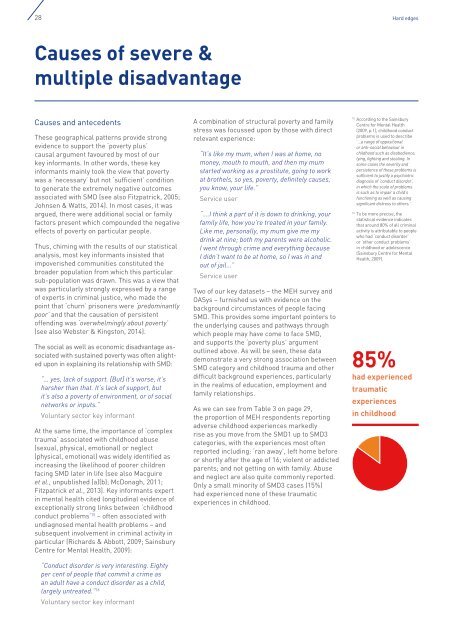Hard_Edges_Mapping_SMD_FINAL_VERSION_Web
Hard_Edges_Mapping_SMD_FINAL_VERSION_Web
Hard_Edges_Mapping_SMD_FINAL_VERSION_Web
You also want an ePaper? Increase the reach of your titles
YUMPU automatically turns print PDFs into web optimized ePapers that Google loves.
28 <strong>Hard</strong> edges<br />
Causes of severe &<br />
multiple disadvantage<br />
Causes and antecedents<br />
These geographical patterns provide strong<br />
evidence to support the ‘poverty plus’<br />
causal argument favoured by most of our<br />
key informants. In other words, these key<br />
informants mainly took the view that poverty<br />
was a ‘necessary’ but not ‘sufficient’ condition<br />
to generate the extremely negative outcomes<br />
associated with <strong>SMD</strong> (see also Fitzpatrick, 2005;<br />
Johnsen & Watts, 2014). In most cases, it was<br />
argued, there were additional social or family<br />
factors present which compounded the negative<br />
effects of poverty on particular people.<br />
Thus, chiming with the results of our statistical<br />
analysis, most key informants insisted that<br />
impoverished communities constituted the<br />
broader population from which this particular<br />
sub-population was drawn. This was a view that<br />
was particularly strongly expressed by a range<br />
of experts in criminal justice, who made the<br />
point that ‘churn’ prisoners were ‘predominantly<br />
poor’ and that the causation of persistent<br />
offending was ‘overwhelmingly about poverty’<br />
(see also <strong>Web</strong>ster & Kingston, 2014).<br />
The social as well as economic disadvantage associated<br />
with sustained poverty was often alighted<br />
upon in explaining its relationship with <strong>SMD</strong>:<br />
“… yes, lack of support. [But] it’s worse, it’s<br />
harsher than that. It’s lack of support, but<br />
it’s also a poverty of environment, or of social<br />
networks or inputs.”<br />
Voluntary sector key informant<br />
At the same time, the importance of ‘complex<br />
trauma’ associated with childhood abuse<br />
(sexual, physical, emotional) or neglect<br />
(physical, emotional) was widely identified as<br />
increasing the likelihood of poorer children<br />
facing <strong>SMD</strong> later in life (see also Macguire<br />
et al., unpublished (a)(b); McDonagh, 2011;<br />
Fitzpatrick et al., 2013). Key informants expert<br />
in mental health cited longitudinal evidence of<br />
exceptionally strong links between ‘childhood<br />
conduct problems’ 15 – often associated with<br />
undiagnosed mental health problems – and<br />
subsequent involvement in criminal activity in<br />
particular (Richards & Abbott, 2009; Sainsbury<br />
Centre for Mental Health, 2009):<br />
“Conduct disorder is very interesting. Eighty<br />
per cent of people that commit a crime as<br />
an adult have a conduct disorder as a child,<br />
largely untreated.” 16<br />
Voluntary sector key informant<br />
A combination of structural poverty and family<br />
stress was focussed upon by those with direct<br />
relevant experience:<br />
“It’s like my mum, when I was at home, no<br />
money, mouth to mouth, and then my mum<br />
started working as a prostitute, going to work<br />
at brothels, so yes, poverty, definitely causes,<br />
you know, your life.”<br />
Service user<br />
“….I think a part of it is down to drinking, your<br />
family life, how you’re treated in your family.<br />
Like me, personally, my mum give me my<br />
drink at nine; both my parents were alcoholic.<br />
I went through crime and everything because<br />
I didn’t want to be at home, so I was in and<br />
out of jail…”<br />
Service user<br />
Two of our key datasets – the MEH survey and<br />
OASys – furnished us with evidence on the<br />
background circumstances of people facing<br />
<strong>SMD</strong>. This provides some important pointers to<br />
the underlying causes and pathways through<br />
which people may have come to face <strong>SMD</strong>,<br />
and supports the ‘poverty plus’ argument<br />
outlined above. As will be seen, these data<br />
demonstrate a very strong association between<br />
<strong>SMD</strong> category and childhood trauma and other<br />
difficult background experiences, particularly<br />
in the realms of education, employment and<br />
family relationships.<br />
As we can see from Table 3 on page 29,<br />
the proportion of MEH respondents reporting<br />
adverse childhood experiences markedly<br />
rise as you move from the <strong>SMD</strong>1 up to <strong>SMD</strong>3<br />
categories, with the experiences most often<br />
reported including: ‘ran away’, left home before<br />
or shortly after the age of 16; violent or addicted<br />
parents; and not getting on with family. Abuse<br />
and neglect are also quite commonly reported.<br />
Only a small minority of <strong>SMD</strong>3 cases (15%)<br />
had experienced none of these traumatic<br />
experiences in childhood.<br />
15<br />
According to the Sainsbury<br />
Centre for Mental Health<br />
(2009, p.1), childhood conduct<br />
problems is used to describe<br />
‘…a range of oppositional<br />
or anti-social behaviour in<br />
childhood such as disobedience,<br />
lying, fighting and stealing. In<br />
some cases the severity and<br />
persistence of these problems is<br />
sufficient to justify a psychiatric<br />
diagnosis of ‘conduct disorder’,<br />
in which the scale of problems<br />
is such as to impair a child’s<br />
functioning as well as causing<br />
significant distress to others.’<br />
16<br />
To be more precise, the<br />
statistical evidence indicates<br />
that around 80% of all criminal<br />
activity is attributable to people<br />
who had ‘conduct disorder’<br />
or ‘other conduct problems’<br />
in childhood or adolescence<br />
(Sainsbury Centre for Mental<br />
Health, 2009).<br />
85%<br />
had experienced<br />
traumatic<br />
experiences<br />
in childhood


